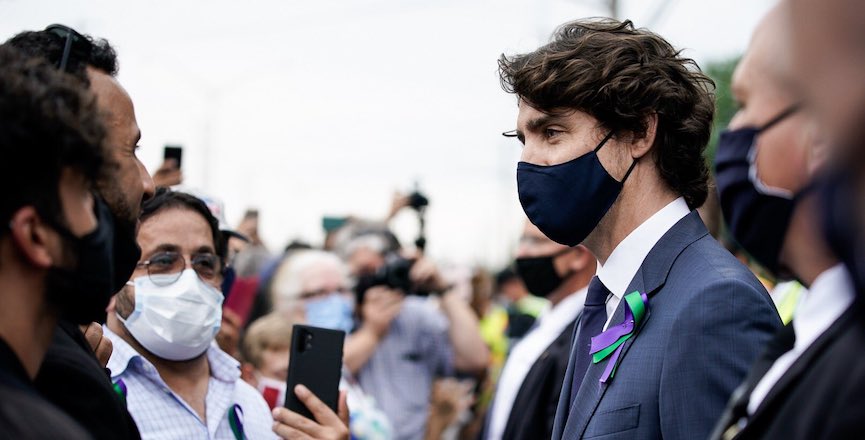Sunday’s tragedy out of London, Ontario has been a great occasion for political rhetoric, with all manner of politicians weighing in to express their sympathies and support for the Muslim community.
Much of it seems disingenuous, however, when one realizes that most of these politicians have done very little to proactively protect Canadian Muslims from hate.
To call the massacre-by-vehicle in London, Ontario terrorism, as the prime minister did, is legitimate. It turns the tables on our all-too-ready tendency to label virtually all Muslims as actual or potential terrorists.
In that context, it is revealing and instructive to read the government of Canada’s official list of terrorist entities.
The overwhelming majority of those listed are notionally Islamic entities. The list includes the familiar Al Qaida, Boko Haram and Al Shabaab, and numerous less-familiar names, such as Harakat ul-Mudjahidin.
Among the small number of listed groups that are not Islamic there are a Tamil group, a Basque organization, a Peruvian group, and something called the Russian Imperial Movement. There is one extremist Jewish group, Kahane Chai (successor to the Jewish Defense League), and only a few white-supremacist, far-right entities, such as the Proud Boys and The Base.
Based on this list, the government of Canada seems to be behind the times. There is much research to the effect that currently, the far-right poses a significantly greater threat to our peace and security than Islamic extremism.
Aden Dur-e-Aden is a Canadian researcher on extremism. In June, she spoke with the Conference of Defence Associations Institute and explained the attraction of far-right ideology and propaganda this way:
“Individuals are attracted to certain extremist ideologies when they feel culturally threatened — when they feel they’re losing their heritage, their privilege, their power, and when they perceive others to be taking their economic opportunities.”
Dur-e-Aden believes Canada must find ways to counter the growing phenomenon of far-right extremism. We are still behind the U.S. and parts of Europe, but we must act now to stop the contagion from spreading here.
This is a task, she argues, as much for the non-governmental sector as for government. That’s because people susceptible to far-right propaganda are likely to be deeply distrustful of official authorities.
We can’t expect those potential extremists will be open to messages from government — however earnest and well-intentioned those messages might be.
Some specific ideas for government
One non-governmental group working in this area is the Canadian Anti-Hate Network. In the aftermath of the murders of four members of a Muslim family in London, the network issued a statement with a number of concrete proposals for both government and citizens.
Those proposals include a royal commission to examine the kind of media and other material hate-filled terrorists consume. In New Zealand the government set up such a commission after a gunman shot 51 people in two mosques in Christchurch, in March 2019.
“We must do the same here,” the Anti-Hate Network says. “We need to name the people and organizations who poured poison into the London terrorist’s ear.”
Among the many conclusions of the New Zealand Royal Commission was that authorities’ excessive and almost exclusive focus on Islamic terrorism caused them to ignore threats from the Islamophobic and white-supremacist varieties.
The Canadian Anti-Hate Network also says we in this country need legislation against what it calls “online harms.”
The federal government has been sitting on such legislation since the end of March.
The proposed new law would deal with such online dangers as child sexual exploitation, the non-consensual sharing of intimate content, and the promotion of violence and hate speech.
The network urges the government to advance that legislation now, without further delay.
“While we don’t know the exact circumstances that led to this terrorist attack yet,” the Canadian Anti-Hate Network says, “we can say definitively that addressing online hate will make attacks like these less likely.”
Finally, the Anti-Hate Network encourages all Canadians to support a number of groups, including the National Council of Canadian Muslims (NCCM) and the Council of Agencies Serving South Asians (CASSA), in their call for a national action summit on Islamophobia.
Nobody wants the government to react in a knee-jerk way just to give the impression it is doing something.
However, when people who said they were acting in the name of Islam committed violent acts, going back to September of 2001, Canada reacted with extreme haste and vigour, and with actions, not just rhetoric.
When Muslims are the victims of repeated acts of terrorist violence our reaction must be equally vigorous, tangible and concrete.
Karl Nerenberg has been a journalist and filmmaker for more than 25 years. He is rabble’s politics reporter.
Image credit: Justin Trudeau/Twitter.



